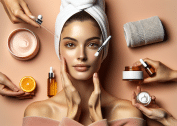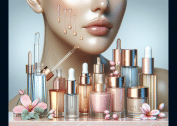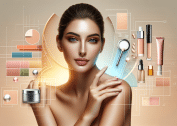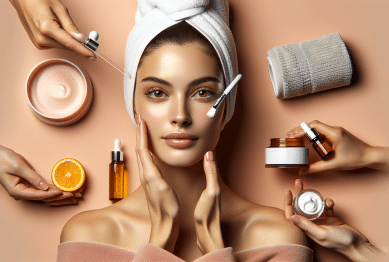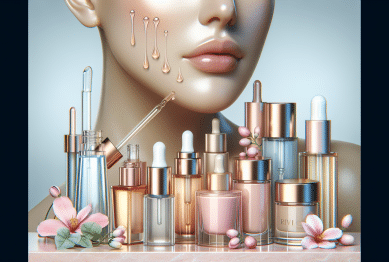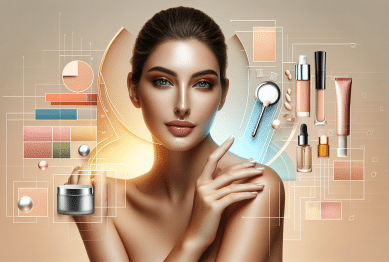Curious about what daily skincare routines really achieve for natural beauty and wellness? Explore the science behind personalized regimens, trending ingredients, and expert-backed habits that help support glowing, healthy skin—without any overhyped promises.
The Importance of Consistent Skincare for Skin Wellness
Personalized skincare routines play a foundational role in wellness and beauty. The skin is not only the body’s largest organ, but it also acts as a protective barrier against environmental stressors like pollutants, UV radiation, and bacterial threats. Establishing consistent habits, such as cleansing and moisturizing, allows you to maintain a healthy complexion and reduce common concerns such as dryness, acne, and premature aging. Consistency is key. Experts often emphasize that even the simplest daily routines—tailored to your unique skin type—can bring visible improvements in radiance and texture over time. This approach invites confidence while nurturing long-term skin health.
Commitment to skincare fosters more than just surface benefits. When you use gentle cleansers, lightweight serums, and protective sunscreens, you are investing in the deeper layers of your skin. The skin’s renewal cycle, which averages around 28 days, means that regular care allows active ingredients to penetrate and produce cumulative results. While it’s tempting to expect instant changes, many dermatologists highlight how steady effort pays off by minimizing irritation and promoting balance. By building habits around skin health, individuals also begin to notice improvements in their overall wellness—such as reduced inflammation and better hydration.
Mental well-being and self-esteem are closely tied to skin health. Daily rituals serve as mindful moments that anchor you to the present. Incorporating relaxing activities, like massaging your face during cleansing or applying moisturizer with gentle strokes, brings about a calming effect. These rituals can help relieve stress and reinforce a positive self-image. Additionally, investing time in personalized routines demonstrates self-care, which, according to research, is linked with increased happiness and lower rates of anxiety. Skincare, therefore, becomes an empowering act—nourishing both appearance and emotional well-being.
Understanding Trending Ingredients in Beauty Products
Interest in trending skincare ingredients continues to rise, as consumers seek effective, evidence-backed solutions for diverse skin goals. Hyaluronic acid, for instance, is a beloved choice due to its incredible capacity to hold moisture—supporting plumper, more supple skin. Niacinamide, a form of vitamin B3, has gained popularity for its soothing and brightening properties, working well for sensitive complexions. Botanical sources like green tea extract, centella asiatica, and licorice root promise antioxidant benefits and help counteract the visible effects of pollution. Choosing these options requires understanding your own skin needs.
Ingredient transparency and science-driven formulations shape much of the industry. Clean beauty trends have encouraged people to opt for products without unnecessary fragrances, parabens, or sulfates—reducing irritation risks. Vitamin C serums are favored for their ability to improve radiance and even skin tone, while peptides and ceramides target firmness and barrier support. However, not all purported miracle ingredients work for everyone. It’s important to patch test new additions, observe results, and adjust as needed to minimize breakouts or sensitivity. Dermatologists suggest starting with lower concentrations when trying potent actives.
Global trends influence ingredient selection as well. Traditional elements like aloe vera and chamomile remain popular for calming inflamed skin, while innovative discoveries such as fermented extracts or microbiome-friendly compounds reshape product development. K-beauty, or Korean skincare, has popularized gentle exfoliating acids and multi-step routines that emphasize layering hydration. These movements reflect a larger shift toward holistic beauty—where overall wellness, not just appearance, is prioritized. Staying informed about ingredient research allows you to make empowered decisions and enjoy a diverse array of textures and formulas that fit evolving needs.
Daily Habits for Protecting and Nourishing Skin
Adopting daily habits for skin protection is essential for long-term beauty and health. Gentle cleansing in the morning and evening removes excess oil, sweat, and environmental debris. Opting for lukewarm water and sulfate-free cleansers helps maintain the skin’s natural lipid barrier. Following with a moisturizer suitable for your type—be it lightweight gel for oily skin or richer creams for dry skin—locks in hydration to prevent flakiness and discomfort. Dermatologists warn against over-cleansing, which may strip essential oils and trigger increased sensitivity or redness.
Sun protection is universally advised for every skin type and age group. Broad-spectrum sunscreens guard against both UVA (aging) and UVB (burning) rays, significantly lowering the risk of skin cancer and visible photoaging. Experts suggest applying SPF 30 or higher every morning and reapplying throughout the day, especially when outdoors. Clothing, hats, and sunglasses offer additional layers of defense. By weaving sun care into the routine, individuals can help maintain an even tone and diminish hyperpigmentation issues over time. These preventive steps are simple yet powerful.
Diet and hydration play an underestimated role in supporting beauty from within. Consuming a variety of nutrient-rich foods—fruits, vegetables, lean proteins, and healthy fats—provides the building blocks for supple, resilient skin. Antioxidant-rich options like berries, carrots, and spinach counteract free radicals, while adequate water intake keeps skin visibly plump and minimizes dullness. Limiting processed foods and sugars is advised due to their potential to worsen breakouts or accelerate aging. These integrative wellness strategies complement topical rituals and underscore the connection between holistic health and external beauty.
The Science Behind Skin Types and Personalized Care
Everyone’s skin is unique, and understanding individual skin types can transform the effectiveness of a daily regimen. Dermatologists broadly categorize skin as normal, dry, oily, combination, or sensitive. These differences stem from genetics, climate, age, and hormonal factors. Normal skin feels balanced and rarely irritates, while oily skin may develop visible shine and enlarged pores due to overproduction of sebum. Dry skin often feels rough or tight, craving extra moisture. Sensitive skin reacts quickly to new products or changing environments, necessitating a minimalist, soothing approach.
Developing a tailored approach boosts results. For oil-prone complexions, lightweight, non-comedogenic products reduce the risk of clogged pores and blemishes. Those with dry or mature skin should gravitate toward creams containing ceramides, glycerin, and hyaluronic acid—resources that restore lost hydration and facilitate repair. Combination skin benefits from a targeted approach: balancing light gels on the T-zone with richer products on dry patches. According to studies, matching product choices to skin type yields greater improvement in texture, clarity, and comfort than generic routines.
Identifying triggers and making seasonal adjustments enhances personalized care. Weather changes, travel, and stress can affect how your skin behaves. Monitoring sensitivity to fragrance, alcohol, or specific actives helps minimize flare-ups. Keeping a simple journal to track reactions can guide better product selection and routine adjustments over time. Dermatologist consultations are recommended for complex cases or persistent concerns. Informed self-knowledge remains the foundation of truly effective home care, reinforcing empowerment and healthy habits.
Addressing Misinformation and Setting Realistic Skincare Goals
Conflicting advice and exaggerated product claims abound in the beauty industry, often making it difficult to know what genuinely promotes wellness. Social media can amplify misinformation, especially about quick fixes, extreme regimens, or unproven home remedies. Reliable sources—board-certified dermatologists, academic organizations, and trusted health institutions—stress the importance of evidence-based routines and realistic expectations. Instead of chasing immediate transformation, embracing gradual, consistent improvement supports beauty and self-esteem in a sustainable way.
Common misconceptions, such as the idea that natural ingredients are always safer than synthetic ones, can be misleading. Both plant-derived and laboratory-created substances have their place and safety profiles, depending on clinical evidence. Overuse of exfoliating acids, retinoids, or essential oils may backfire, causing irritation or damage to the skin barrier. Seasoned experts advise starting with basic steps—a reliable cleanser, moisturizer, and sunscreen—before adding specialized treatments, and to always patch test when investigating new formulas.
Goal-setting around skin wellness should factor in lifestyle, genetics, and environment. Progress may look different for everyone and is not always linear. Tracking subtle changes such as improved hydration, smoother texture, or reduced sensitivity allows for motivation and satisfaction without harsh comparisons. Redefining beauty as a journey—focused on health, comfort, and confidence rather than flawless perfection—brings a sense of freedom and joy to daily self-care rituals. This approach cultivates lasting wellness and gratitude toward your body’s natural resilience.
Incorporating Mindfulness for Radiant Beauty
Mindful skincare is shaping the modern wellness movement. Taking time to be present during your routine, rather than rushing through each step, allows for both physical and psychological rewards. This doesn’t necessarily mean elaborate, multi-step regimens. Instead, it emphasizes the act of tuning in—checking for changes in your skin, noticing shifts in mood, and savoring sensorial moments. Gentle facial massages, deep breathing, or gratitude practices can blend seamlessly into these quiet rituals.
Research supports the idea that mindfulness lowers stress hormones, which in turn may reduce inflammation and flare-ups. People who integrate gratitude for their bodies—rather than focusing on flaws—tend to experience higher self-esteem and satisfaction with their appearance. Applying products slowly, inhaling natural scents, and enjoying the process brings relaxation that’s as restorative as the cream or serum itself. Integrating mindfulness into beauty fosters a holistic mindset where inner peace and outer glow go hand in hand.
Balance is the ultimate goal. Beauty routines should support your lifestyle, not complicate it. Mindful intentions—paired with evidence-based product choices—lead to more consistent routines and contentment with results. Whether you dedicate ten minutes or one to self-care, doing so with awareness amplifies the impact. Embracing mindful beauty elevators both well-being and your radiance, empowering you to face the world with confidence and purpose.
References
1. American Academy of Dermatology Association. (n.d.). Skin care: Tips for healthy skin. Retrieved from https://www.aad.org/public/everyday-care/skin-care-basics/care
2. Harvard Health Publishing. (n.d.). What to know about skin care. Retrieved from https://www.health.harvard.edu/staying-healthy/what-to-know-about-skin-care
3. Mayo Clinic Staff. (n.d.). Healthy skin: The body’s largest organ. Retrieved from https://www.mayoclinic.org/healthy-lifestyle/adult-health/in-depth/skin/art-20048286
4. National Center for Complementary and Integrative Health. (n.d.). Mind and body approaches for health problems. Retrieved from https://www.nccih.nih.gov/health/providers/digest/mind-body-approaches-for-health-problems-science
5. Johns Hopkins Medicine. (n.d.). Skin care & aging: Tips and facts. Retrieved from https://www.hopkinsmedicine.org/health/wellness-and-prevention/skin-care-and-aging
6. Cleveland Clinic. (n.d.). How to keep your skin healthy. Retrieved from https://health.clevelandclinic.org/how-to-keep-your-skin-healthy


